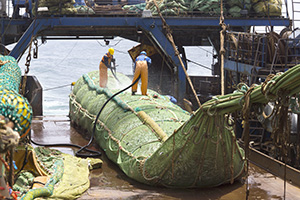Fish Processing Boat Injuries

While the dangers to crew members onboard commercial fishing boats seem obvious, many more serious injuries happen behind closed doors in the fish processing plants and processing boats. Many of these injuries are as a result of poorly maintained equipment, spoiled or poorly prepared or stored foods causing food poisoning, ecoli or listeria, infections from cuts and scrapes, poor lighting resulting in slips and falls, lifting injuries / back injuries, amputations and even death. Many fish processors lose parts of fingers from cutting accidents, traumatic amputations of hands from outdated machinery sometimes used without proper safety guards. Workers in the refrigeration units may be exposed to high pressure ammonia gas leaks. Ammonia inhalation can cause permanent lung damage and scarring, eye and cornea damage, brain damage and even death.
When injuries on a commercial fishing boat or fish processing boat occur, it is extremely important that an injury report or accident report is filed with the supervisor or shift leader and a copy is retained. The injured worker must document the time and place of the event and make sure to describe in the accident report what happened and how it should have been prevented. Names of witnesses along with phone numbers should also be included or at least gathered for future reference.
Injuries to commercial fishermen and fish processing plant workers on a boat, barge or vessel fall under the Jones Act. The injured worker is entitled to receive maintenance and cure benefits similar to workers compensation, but with many more additional damages available against the negligent employer. These Jones Act damages may include monetary compensation for past and future pain and suffering, lost earning capacity, loss of enjoyment of life lost wages, and medical expenses.
Under the weekly maintenance and cure benefits, the injured worker the employer (usually through an insurance carrier) is required to pay weekly wages until you have reached maximum medical improvement. If the employer refuses to pay maintenance and provide cure, then the worker has a new and separate cause of action they can file against them for this refusal including attorneys fees and punitive damages for this willful refusal to pay what is owed. The employer is also required to provide needed medical treatment to treat and cure the injury. If the employer refuses, another punitive claim may be filed as well. Lastly under the Jones Act, the injured fisherman or process worker is entitled to full wages until the end of the contract, not just the limited daily wages under maintenance.
Fishing Boat Injury? Talk to a Maritime Injury Attorney Now
Whether you work on a crab boat, a commercial fishing boat, fishing processing ship, trawler or working as a long-liner, deckhand, cook, mechanic, seiner, dredger, gill netter, dragger or working in any capacity on a fishing boat, you have legal rights to compensation under the Jones Act and numerous Maritime Injury laws affording you protection and remedy for your injuries and damages. Call and talk to a Maritime Personal Injury Lawyer about what can be done to protect your rights and maximize your recovery. Call us 24/7 at 1-800-883-9858.
.jpg)